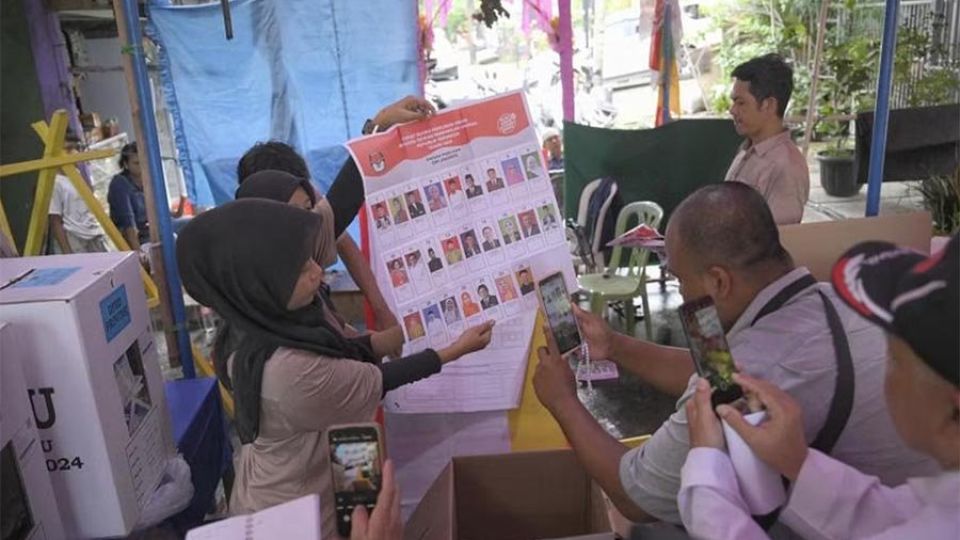February 14, 2024
JAKARTA – Indonesian presidential candidate Prabowo Subianto and his running mate Gibran Rakabuming Raka are on course for electoral victory, with a decisive lead over their rivals based on 75 per cent of sample votes counted on Feb 14.
Based on past elections, this would be a reliable indicator of the eventual outcome.
At around 8pm Singapore time, polling agency Poltracking Indonesia gave the Prabowo-Gibran pair 59.17 per cent of the votes, based on three-quarters of sample votes counted. Former Jakarta governor Anies Baswedan and senior politician Muhaimin Iskandar captured 24.5 per cent of the votes, while former Central Java governor Ganjar Pranowo and former law and security minister Mahfud MD won 16.34 per cent.
In a show of confidence in the early results, the Prabowo-Gibran campaign team’s deputy chief Habiburokhman told The Straits Times: “This is the victory of the Indonesian people. The result (of the quick count) is much higher than the results of surveys prior to the presidential election.”
Mr Habiburokhman, who goes by one name, added: “This means our people want to see continuity to Mr Jokowi’s achievement so far, and our people believe Mr Prabowo is the one who can take the lead.”
Research institute Lembaga Survei Indonesia showed that the Prabowo-Gibran team won 57.36 per cent of the votes, based on 75 per cent of sample ballots counted. The Anies-Muhaimin pair garnered 25.41 per cent, while the Ganjar-Mahfud team secured 17.23 per cent.
Similarly, pollster Indikator Politik Indonesia also put the Prabowo-Gibran pair ahead of their rivals, with 57.88 per cent of the votes, based on 75 per cent of sample ballots counted. The Anies-Muhaimin team had 25.66 per cent and the Ganjar-Mahfud team garnered 16.46 per cent.
Mr Surya Tjandra, a spokesman for the Anies-Muhaimin campaign team, said they will wait for the official results from the General Elections Commission (KPU). He also claimed that the team has collected evidence of electoral fraud.
“We can say the hope for change is clearly there in Indonesia, but it is not reflected (in the quick count results) because there have been distortions, such as the use of state apparatus to direct votes for Mr Prabowo, the politicisation of social aid and the use of intimidation.”
Indonesian law states that a presidential candidate needs a simple majority – or more than 50 per cent – of the votes to win. They also need to attain at least 20 per cent of the votes in half of Indonesia’s 38 provinces.
If these do not happen, the top two pairs of candidates will enter a run-off vote in June, with the third pair eliminated.
Current Defence Minister Prabowo, who is a former special forces lieutenant-general, had been touted as the front runner in various electability surveys before the election.
Mr Prabowo, whose running mate Mr Gibran is President Joko Widodo’s son, has vowed to continue Mr Widodo’s development programmes and legacy projects, including the planned relocation of the administrative capital from Jakarta to East Kalimantan.
Mr Ganjar has promised to improve the President’s policies on education and healthcare, while Mr Anies has said he would review and roll back some programmes, such as the capital relocation.
Millions of Indonesians cast their ballots earlier on Feb 14 to elect not only a president and a vice-president, but also parliamentary and local representatives. In the legislative poll, thousands of lawmaker hopefuls seek to fill 580 seats in the national Parliament known as the House of Representatives, and around 20,000 seats at the regional level.
These ballots will be first tallied at the local district levels before being recounted at the national level for both presidential and legislative elections.
Under Indonesia’s elections law, the vote-counting process may take up to 35 days to be completed, given the large number of eligible voters of around 205 million and the vast territory. The General Elections Commission has said official results are expected to be released by March 20 at the latest.
Official results are not expected to differ significantly from quick count tallies.
Since they were first introduced during the inaugural presidential election in 1999, quick counts conducted by polling agencies and research institutions have become an alternative credible method to predict the results in the world’s biggest single-day elections.
Thousands of field workers and volunteers were deployed to polling stations in 38 provinces nationwide to take vote samples.
Mr Widodo defeated Mr Prabowo in the 2014 and 2019 presidential elections. He won in 2014 with 53.15 per cent of the votes. For his re-election in 2019, Mr Widodo secured 55.5 per cent of the votes against Mr Prabowo’s 44.5 per cent.
The latter’s protest over the result led to two days of deadly riots in Jakarta, claiming at least eight lives and leaving hundreds more injured.

